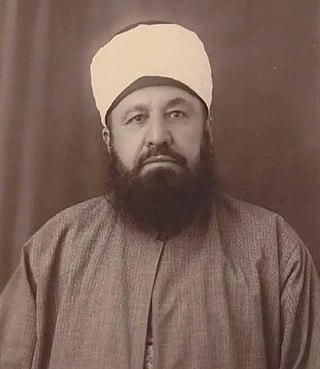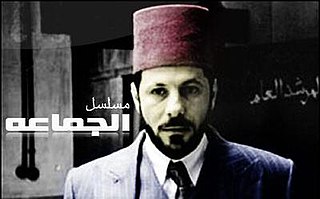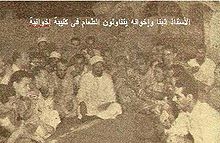
Islamism refers to religious and political ideological movements that believe that Islam should influence political systems, and generally oppose secularism. Its proponents believe Islam is innately political, and that Islam as a political system is superior to communism, liberal democracy, capitalism, and other alternatives in achieving a just, successful society.

The Society of the Muslim Brothers, better known as the Muslim Brotherhood is a transnational Sunni Islamist organization founded in Egypt by Islamic scholar and schoolteacher Hassan al-Banna in 1928. Al-Banna's teachings spread far beyond Egypt, influencing today various Islamist movements from charitable organizations to political parties.

The Salafi movement or Salafism is a revival movement within Sunni Islam, founded in the late 19th century and remains influential in the Islamic world to this day. The name "Salafiyya" is a self-designation, to call for a return to the traditions of the "pious predecessors", the first three generations of Muslims, who are believed to exemplify the pure form of Islam. In practice, Salafis claim that they rely on the Qur'an, the Sunnah and the Ijma (consensus) of the salaf, giving these writings precedence over what they claim as "later religious interpretations". The Salafi movement aimed to achieve a renewal of Muslim life and had a major influence on many Muslim thinkers and movements across the Islamic world.

Pan-Islamism is a political movement which advocates the unity of Muslims under one Islamic country or state – often a caliphate – or an international organization with Islamic principles. Historically, after Ottomanism, which aimed at the unity of all Ottoman citizens, Pan-Islamism was promoted in the Ottoman Empire during the last quarter of the 19th century by Sultan Abdul Hamid II for the purpose of preventing secession movements of the Muslim peoples in the empire.
The History of the Muslim Brotherhood in Egypt (1939–1954) discusses the History of the Muslim Brotherhood in Egypt from its actions during World War II to its official dissolution by the Egyptian government.
The History of the Muslim Brotherhood in Egypt (1928–1938) discusses the History of the Muslim Brotherhood in Egypt from the Brotherhood's inception to its development into a viable political force.
The Muslim Brotherhood is an Islamic organization that was founded in Ismailia, Egypt by Hassan al-Banna in March 1928 as an Islamist religious, political, and social movement. The group spread to other Muslim countries but has its largest, or one of its largest, organizations in Egypt, where for many years it has been the largest, best-organized, and most disciplined political opposition force, despite a succession of government crackdowns in 1948, 1954, 1965 after plots, or alleged plots, of assassination and overthrow were uncovered. Following the 2011 Revolution the group was legalized, and in April 2011 it launched a civic political party called the Freedom and Justice Party (Egypt) to contest elections, including the 2012 presidential election when its candidate Mohamed Morsi became Egypt's first democratically elected president. One year later, however, following massive demonstrations, Morsi was overthrown by the military and arrested. As of 2014, the organization has been declared a terrorist group by Russia, Egypt, UAE, Saudi Arabia and is once again suffering a severe crackdown.

Muhammad Rashid Rida was an Islamic scholar, reformer, theologian and revivalist. An early Salafist, Rida called for the revival of hadith studies and, as a theoretician of an Islamic state, condemned the rising currents of secularism and nationalism across the Islamic world following the abolition of the Ottoman sultanate. He championed a global pan-Islamist program aimed at re-establishing an Islamic caliphate.
Al-Manār, was an Islamic magazine, written in Arabic, and was founded, published and edited by Rashid Rida from 1898 until his death in 1935 in Cairo, Egypt. The magazine championed the superiority of Islamic religious system over other ideologies and was noteworthy for its campaigns for the restoration of a pan-Islamic Caliphate.

Said Ramadan was an Egyptian political activist, and one of the preeminent leaders of the Muslim Brotherhood.
Gamal al-Banna was an Egyptian author, and trade unionist. He was the youngest brother of Hassan al-Banna (1906–49), founder of the Muslim Brotherhood. Al-Banna was considered a liberal scholar, known for his criticism of Islamic traditional narratives. He rejected 635 Hadiths of Sahih Bukhari and Sahih Muslim which he found contradictory to the Qur'an. He was a great-uncle of the Swiss Muslim academic and writer Tariq Ramadan.

Hassan al-Hudaybi was the second "General Guide", or leader, of the Muslim Brotherhood organization, appointed in 1951 after founder Hassan al-Banna's assassination two years earlier. Al-Hudaybi held the position until his death in 1973.

Islamic modernism is a movement that has been described as "the first Muslim ideological response to the Western cultural challenge", attempting to reconcile the Islamic faith with values perceived as modern such as democracy, civil rights, rationality, equality, and progress. It featured a "critical reexamination of the classical conceptions and methods of jurisprudence", and a new approach to Islamic theology and Quranic exegesis (Tafsir). A contemporary definition describes it as an "effort to re-read Islam's fundamental sources—the Qur'an and the Sunna, —by placing them in their historical context, and then reinterpreting them, non-literally, in the light of the modern context."

Salafi jihadism, also known as Salafi-jihadism, jihadist Salafism and revolutionary Salafism, is a religiopolitical Sunni Islamist ideology that seeks to establish a global caliphate. An extreme, jihadist interpretation of the broader Salafism movement, Salafi jihadism is characterized by the advocacy of physical violence against both non-Muslims, and self-proclaimed Muslims deemed to be heretics or apostates. In a narrower sense, jihadism refers to the belief that armed confrontation with political rivals is an efficient and theologically legitimate method of socio-political change. The Salafist interpretation of sacred Islamic texts is "in their most literal, traditional sense", which adherents claim will bring about the return to "true Islam".

Sayyid Ibrahim Husayn Shadhili Qutb was an Egyptian political theorist and revolutionary who was a leading member of the Muslim Brotherhood. He is dubbed the "father of Salafi jihadism", the religio-political doctrine that underpins the ideological roots of global jihadist organisations such as al-Qaeda and ISIL.

Al-Gama'a is an Egyptian television drama, Historical and Political drama series written by Wahid Hamid, directed by Mohammed Yasin and produced by Kamel Abu Ali. The series began filming in January 2010 with a budget of 50 million Egyptian pounds. The show deals with the rise of the Muslim Brotherhood, Egypt's largest Islamist political group, which was officially banned but nonetheless tolerated to an extent before the revolution. Critics have decried the show's pro-government stance, charging that it plays into the Egyptian government's agenda prior to the 2010 Egyptian parliamentary elections.

The Ahmadiyya is an Islamic movement in Egypt with origins in the Indian subcontinent. Although the earliest contact between Egyptians and the Ahmadiyya movement was during the lifetime of Mirza Ghulam Ahmad, its founder, the movement in Egypt was formally established in 1922 under the leadership of its second Caliph Opposition to the Ahmadiyya grew particularly in the latter part the 20th century and Ahmadis have seen increased hostility in Egypt more recently. There are up to 50,000 Ahmadi Muslims in Egypt.
Al Nadhir was an Arabic language weekly Islamic magazine which was published in Cairo, Egypt, for one year between 1938 and 1939. Its subtitle was A Political Islamic Weekly. It is known for being one of the official organs of the Muslim Brotherhood for which it was banned in October 1939.
Al Fath was a weekly political magazine which existed between 1926 and 1948 in Cairo, Egypt. The magazine is known for its cofounder and editor Muhib Al Din Al Khatib and for its role in introducing Hasan Al Banna, founder of the Muslim Brotherhood, to the Egyptian political life. It called itself as the mirror of the Islamic world.

Before the outbreak of the First World War, scholars of the Arab Salafiyya movement represented the leading voice of Islamic religious dissent within the Ottoman Empire. Their most influential theologian Muhammad Rashid Rida, an ardent critic of Abdul Hamid II and Turkish nationalism, regarded Ottoman kings as unqualified to rule over the affairs of the Muslim World. While excoriating the Ottomans as an artificial caliphate based on unjust wars and conquests; Salafi scholars nonetheless strongly forbade rebellion against the Ottoman authority due to their insight of dangers posed by the expanding European colonialism. Rashid Rida and his pupils perceived the Ottoman state as an essential entity for allowing Muslims to successfully repel European imperial powers and rebuked the proponents for an alternative Caliphate; suspecting them of serving the aims of imperial powers. All of this changed with the Ottoman entry into World War 1 in October 1914, on the side of the Central Powers. Rashid Rida viewed the war as part of the secular Turkish nationalist programme of the Young Turks, a faction he vehemently denounced as murtadd (apostates).














